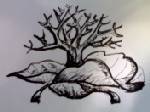December 2008
 Tsamba likagwa manyazi yagwira mtengo. (Nyanja and Chewa)
Tsamba likagwa manyazi yagwira mtengo. (Nyanja and Chewa)
When a leaf falls to the ground, the tree gets the blame/the shame goes to the tree. (English)
Nyanja (Mozambique, Zambia, Zimbabwe) Proverb
Chewa (Malawi) Proverb
Background, Explanation, Meaning and Everyday Use
In African societies, particularly in rural areas south of the Sahara, family unity (a sense of belonging) and pride are strongly emphasized. Because the family unit is respected, members of that family will do all they can to ensure that the offspring are taught good manners and how to conduct themselves in society in order to bring honor to the family, respect for elders and members of the opposite sex, kindness, gentleness and so on. It is also not uncommon for the whole community to be a watchdog over the behavior and conduct of the young generation. Therefore when a young person (boy) commits an offence, say of disrespecting an older person, any older person can discipline that offender, even by whipping, without necessarily referring the matter to the parents. Even so, the person administering the punishment will still be obliged to report the matter to the parents who may also administer additional sanctions on the offender. The parents will thank the person who disciplined the boy and encourage him to continue being vigilant for the sake of good order and discipline in society.
So the meaning of this Zambia proverb is that the sins of the child are traced to the parents. This will be especially so in instances where the offence has a wider significance and brings shame on the family and community as a whole such as fornication, drug abuse and stealing. In such cases and others of similar significance, the shame touches both the family and the society in which the offender lives as if to say that they all failed to give the offender a morally upright upbringing. Hence Tsamba likagwa manyazi yagwira mtengo (“mtengo” being both the family and the community). Another proverb has a similar connotation: Nkhuyu zodya mwana zinapota amache meaning The figs that the child ate affect the mother. When the figs result in an upset stomach at night, it is the mother who has to escort the child to the pit latrine outside!
Biblical Parallels
 Absalom, David’s son, was very beautiful to look at and had about him an air of authority and command. His father loved him and went out of his way to ensure that he provided for all his son’s needs. However, unlike Samuel, Absalom was ambitious, headstrong and wanted to set a parallel judicial system to his father’s (2 Samuel 15 – 19). At Absalom’s death David grieved sorely and so did the people. The case of Abel and Cain is another. Then there is Noah and his two daughters. Dinah (Genesis 34); Amon and Tamah (2 Samuel 13); Samson (Judges 14 – 16); the Prodigal Son (Luke 15), etc.
Absalom, David’s son, was very beautiful to look at and had about him an air of authority and command. His father loved him and went out of his way to ensure that he provided for all his son’s needs. However, unlike Samuel, Absalom was ambitious, headstrong and wanted to set a parallel judicial system to his father’s (2 Samuel 15 – 19). At Absalom’s death David grieved sorely and so did the people. The case of Abel and Cain is another. Then there is Noah and his two daughters. Dinah (Genesis 34); Amon and Tamah (2 Samuel 13); Samson (Judges 14 – 16); the Prodigal Son (Luke 15), etc.
Contemporary Use and Religious Application
When believers succumb to the devil’s wiles, it grieves God’s heart and Jesus and the angels cry in heaven. God sent his only begotten son to die for our sins so that we might have life abundantly. Our sins make the name of the Lord to be besmeared and denigrated. The damage is so grave that we should always ask for God’s grace to protect us from all evil, for us to live a sanctified life.
Hector HL Banda
President, Zambian P.E.N. Centre
Lusaka, Zambia
Email: lanku2001@yahoo.com
Illustrations provided by:
Professor Cephas Yao Agbemenu
Department of Fine Arts
Kenyatta University
P.O. Box 43844
Nairobi, Kenya
Cellphone: 254-723-307-992
Email: cyagbemenu@yahoo.com

